They say they want to 'free UU from censorship and indoctrination'
Student party VSP attacks university for being ‘leftist’ and ‘woke’
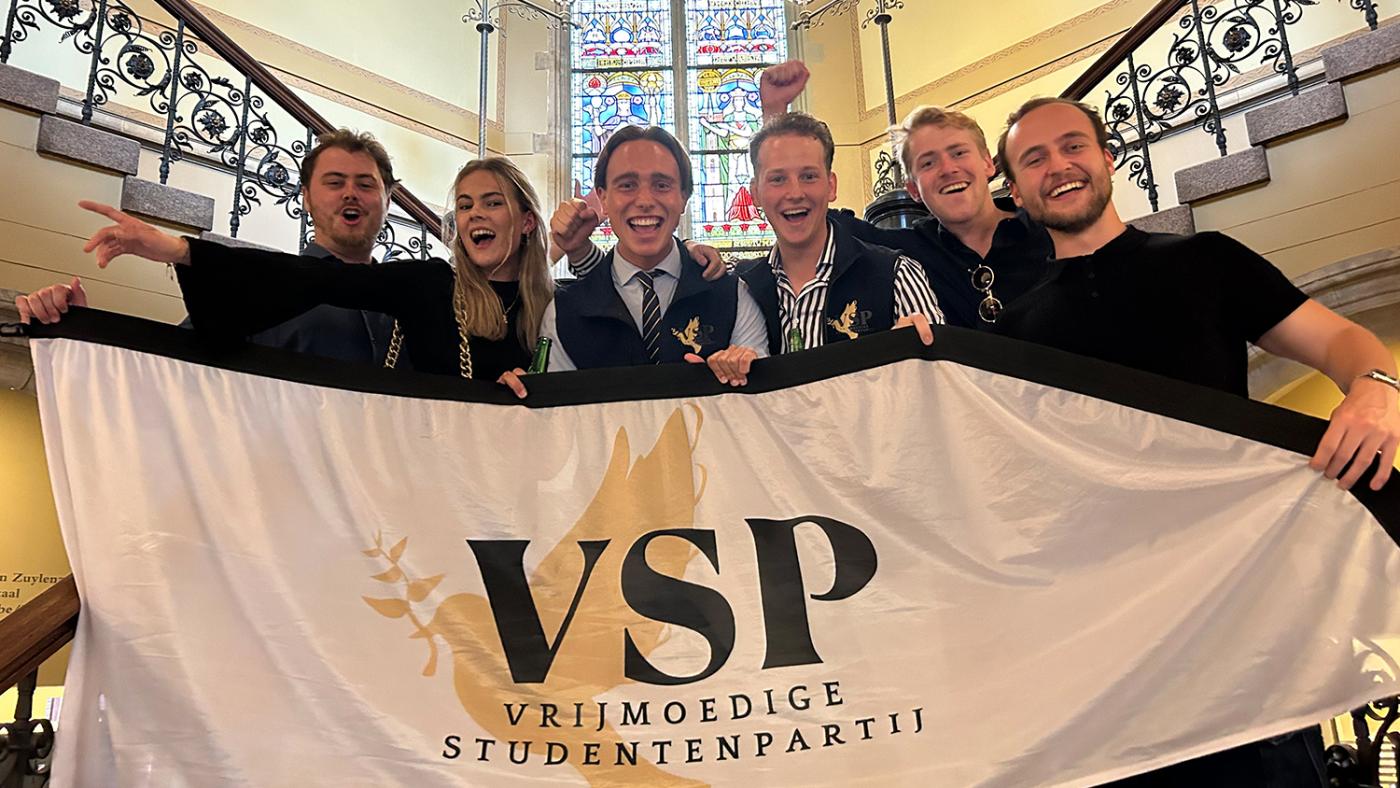
"What kind of Fox News nonsense is this?" In November, DUB's Dutch page published an op-ed written by Lloyd-Leonard Opdam, a student of Administrative & Organisational Science and leader of the Bold Students Party (Dutch acronym: VSP). Many students were outraged with the piece.
In the op-ed, Lloyd-Leonard welcomes the austerity measures announced by the Dutch government, saying universities would finally have less money to finance what he deems as "woke" measures and "pseudoscientific" courses such as Gender studies, Decolonisation Studies and Environmental Studies. He also wrote that the government's idea to fine students who take longer than one additional year to graduate (which has since been abandoned) would be a good way to force lazy students out of their "cuddly bubble". His opinions didn't sit well with many DUB readers.
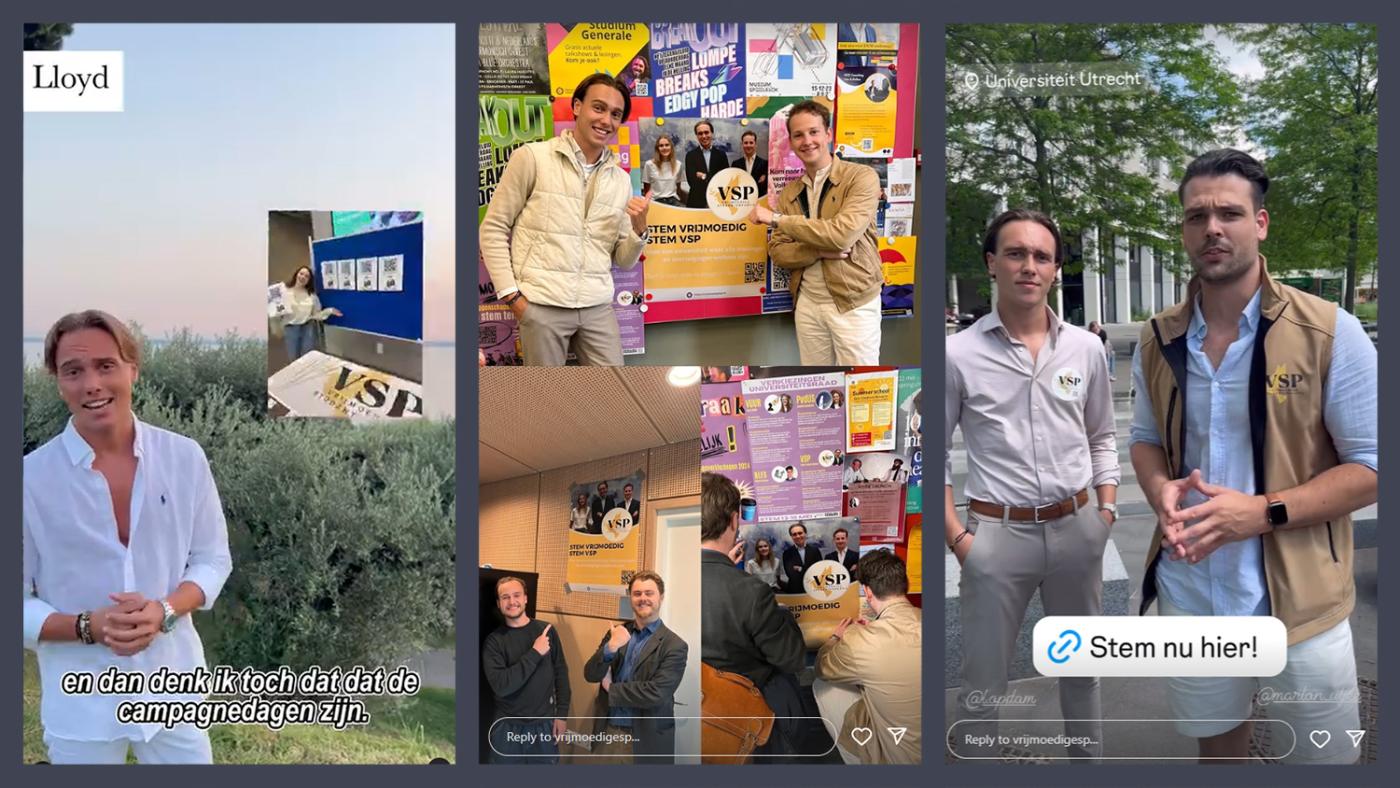
Photos: VSP's Instagram page
Student representatives
Those who have been following university politics more closely were less surprised by the op-ed. Lloyd-Leonard is the leader of VSP, a new student party which obtained two of the 12 student seats in the Utrecht University Council last year. They also won four of the 10 seats in the Faculty Council of Law, Economics & Governance.
This shows that the extreme right-wing discourse that is rampant in national politics has also found its way to universities. Last year, before debuting at UU, VSP entered VU Amsterdam's student council. In this year's VU elections, the party won four of the 11 seats. In Rotterdam, a similar far-right student party, Liberi Erasmi, is now the largest student faction.
Lloyd-Leonard is the face of the party's Utrecht branch, alongside current University Council member Sven Hospers, another Administration & Organisation Science student. The Rotterdam and Amsterdam parties served as an example for them. Lloyd-Leonard was elected to both councils but gave up his seat on the University Council for an exchange in Rome.
Hospers argues that the university has always had plenty of students with right-wing views. "However, conservative students have never been strong enough to unite and join a party. This is finally happening now. I think we've reached a tipping point. Many students tell us that it's getting harder and harder to speak their minds in class."
The council member does not know exactly how many students are affiliated with VSP's Utrecht branch, but he believes it's more than a hundred. "Many students support us but prefer not to become active in the party because they are afraid of speaking out."
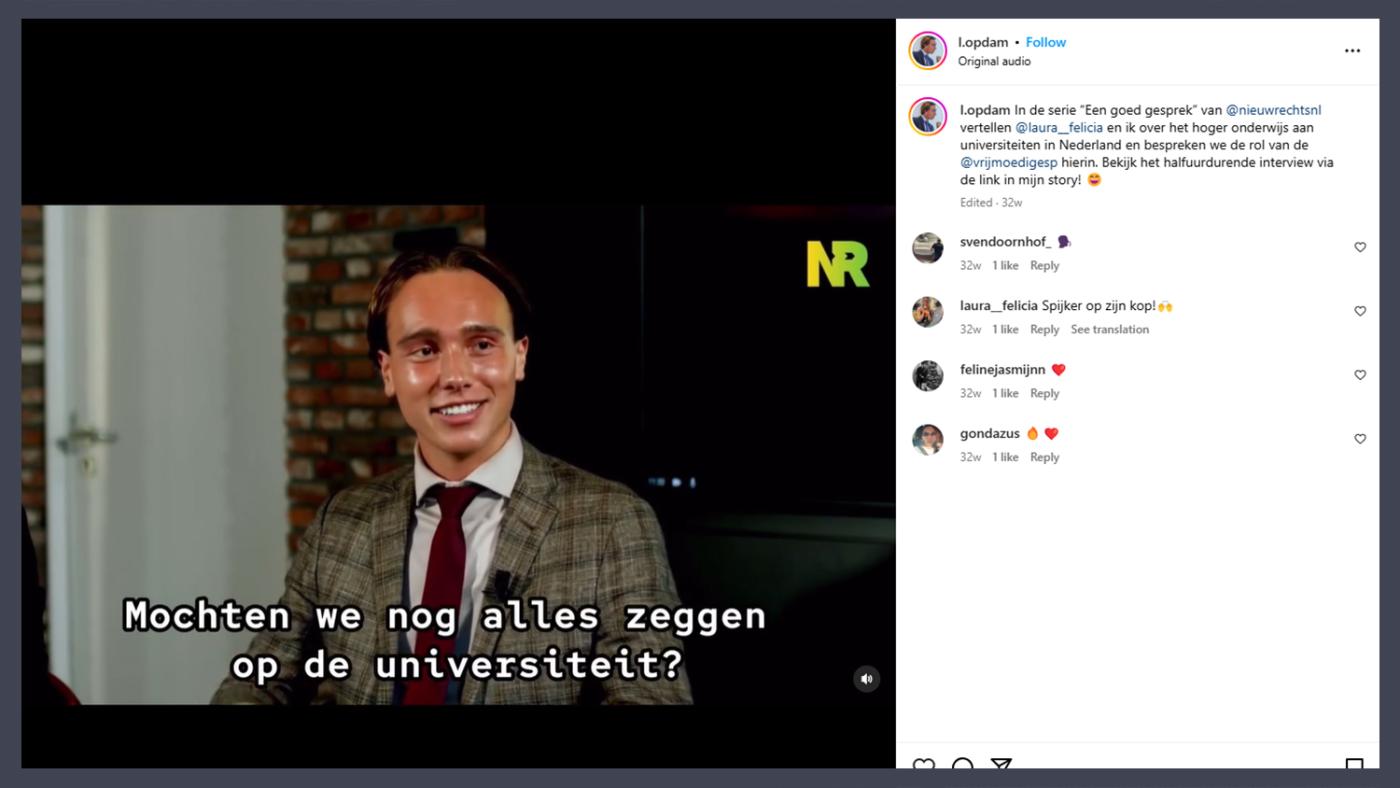
Their views
At the beginning of the academic year, the party immediately made itself heard on a website called Nieuw Rechts (The New Right). Its members reacted to the appointment of four women to the role of professors at the Faculty of Humanities. Their research interests include gender, culture, nature and decolonisation.
Based on a description of the teaching assignments, the student party accused the scholars of "disguised activism with neo-Marxist ideas". The party members said they were concerned about the quality of education and demanded an investigation into academic freedom at UU. Hospers is currently working on a memo about this.
VSP portrays itself as the guardian of academic freedom and open debate. The party says it opposes "cancel culture" in the university. On its website, VSP vows to "safeguard education from censorship and indoctrination". They also oppose the appointment of "diversity officers" and the establishment of "safe spaces" as they believe these two things limit "confrontation with other ideas."
In addition, VSP wants fewer international students in the Netherlands and Dutch to be the language of instruction. As far as they are concerned, universities should be "proud" of Dutch history "rather than guilty and apologetic."
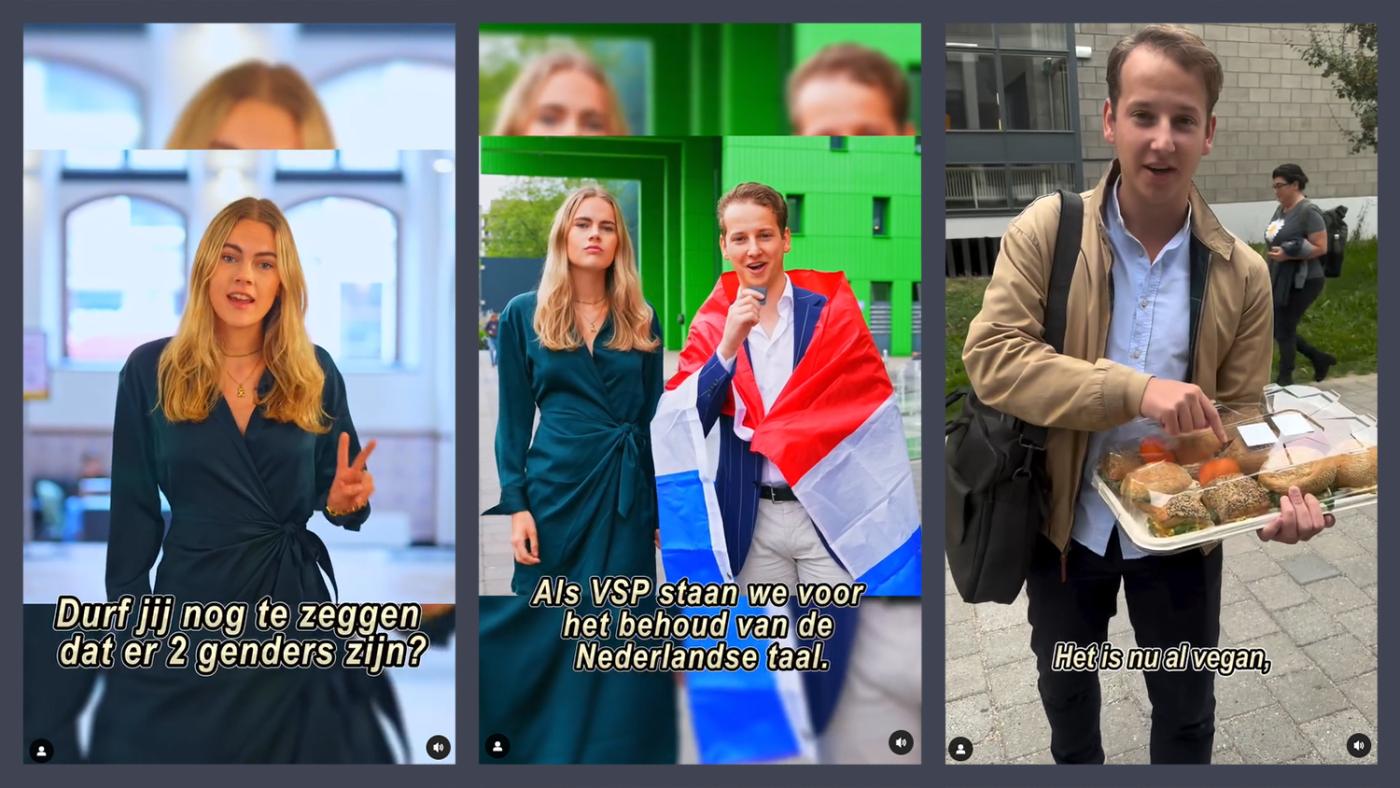
Social media
These positions are not the only thing setting VSP apart from other student parties. VSP is also very active on social media and traditional media. Several VSP councillors write for the website Nieuw Rechts and/or have been interviewed in articles by other news outlets.
The party has attracted the attention of other right-wing outlets such as Ongehoord Nederland and De Telegraaf. Both reported on the party's Amsterdam branch. Lloyd-Leonard was featured in an article by Café Weltschmerz, talking about the "madness" going on at universities. o
Some of the party's members were already politically active before VSP. Some of them were on candidate lists for several councils at UU. Others are affiliated with Forum voor Democratie (FvD), a far-right party at the national level. Four of the 12 candidates either hold positions within FvD or are involved with the party in other ways. There are VSP members in FvD committees and factions. Their names have also been on FvD candidate lists for parliamentary elections.
Frank van Breukelen, who was elected to the Faculty Council of Law, Economics & Governance, is also a member of FvD's Utrecht branch. Manon Vianen, a member of the University Council, used to be active in FvD's youth branch, JFvD. She is also the girlfriend of former MP Freek Jansen. Lloyd-Leonard used to be affiliated with the political party JA21: he campaigned for the party and posed with party leader Joost Eerdmans.
According to Hospers, who was not politically active before VSP, his party cannot be associated with FvD. "We are a party for conservative students, regardless of political affiliation. We don't think it's a problem that Frank is also a councillor for FvD in the province. The university is a completely different organisation, it is at a different level. We are not affected by FvD or other parties. What matters to us is the VSP ideology."
GNSV
Van Breukelen and Bram van de Kerk, both student members in the Faculty Council of Law, Economics & Governance, also serve on the board of the Greater Netherlands Student Association (GNSV), a controversial far-right association with branches in Leiden and Nijmegen. GNSV will debut its Utrecht-based branch in the next academic year.
Many GNSV members are also part of Geuzenbond, a far-right youth group currently monitored by the police and security services. In a written response, Van de Kerk admitted to having been active for Geuzenbond in the past. Van Breukelen says he has never been part of this group.
According to the local newspaper AD, in 2021, Van de Kerk attended a protest against the inauguration of a refugee reception centre in Utrecht. Protesters held a banner saying "Stop the replacement", while others held the Prince's Flag, a controversial symbol often used by far-right groups in the Netherlands.
In a written response, Van de Kerk says it is "unjustified" for the term "replacement" to be controversial. According to him, the word reflects an observation, not a conspiracy theory, as replacement is "it makes sense to say that replacement is the terminus to which current immigration policy is leading us." He believes "the native Dutch will become a minority in the Netherlands" if immigration policy remains as it is. He does not consider the Prince's Flag something extreme either, but rather "a symbol of patriotism, carried by the rebels of the Eighty Years’ War”.
Sven Hospers says he is not aware of all the activities of other VSP members outside the party, so he prefers not to comment on that. "What I do know is that our people are knowledgeable and golden. We take them as individuals and they are not racist or fascist. People might try to push us into the far-right corner, but we stand for academic freedom, the Dutch language, and maintaining excellence. Is that right-wing extremism? I don't think so. These are broad, reasonable positions."
Good cooperation with other parties
Although VSP debuted in the council with big words, so far it has been pretty quiet in the meetings, especially if we compare it to Rotterdam, where Liberi Erasmi immediately annoyed others by presenting a list of 34 questions about the university's "ideological neutrality". In Amsterdam, council members often got annoyed at VSP because the party would ignore meeting rules.
So far, there have been no confrontations in the Utrecht University Council or the Law, Economics & Governance Council. "This may not be visible to outsiders, but we are making our point. When it comes to co-participation councils, a lot happens behind closed doors. The public meetings that everyone can attend are a bit more ceremonial."
"In an ideal world, we would like to abolish a few university projects, such as climate-neutral operations but there is no support for that. We can't even try to achieve that with only two councillors. So, I prefer to be a more constructive voice in the council. Besides, we can use social media to show the students of Utrecht that these are topics you can and should discuss." For example, one of the party's videos on Instagram opposes plant-based canteens.
UU Council member Lieke Fokker, from the left-wing party Vuur, is not dissatisfied with the presence of her VSP colleagues in the council. "Our ideals are the complete opposite of theirs, but we haven't had any problems with them so far. It is important to respect each other."
Since there have been no proposals from VSP so far, Vuur members haven't had to react to them. Asked whether she is surprised by that, Fokker says: "Yes and no. You might expect a faction with such a programme to be louder, but, on the other hand, this is a new party and they are getting used to the council."
Sven Hospers agrees that the relations with other parties have been cordial. "I have very nice and open conversations with the other councillors. I also think it's interesting to have an international student on the council because that provides a different perspective. All in all, it feels like a warm bath."
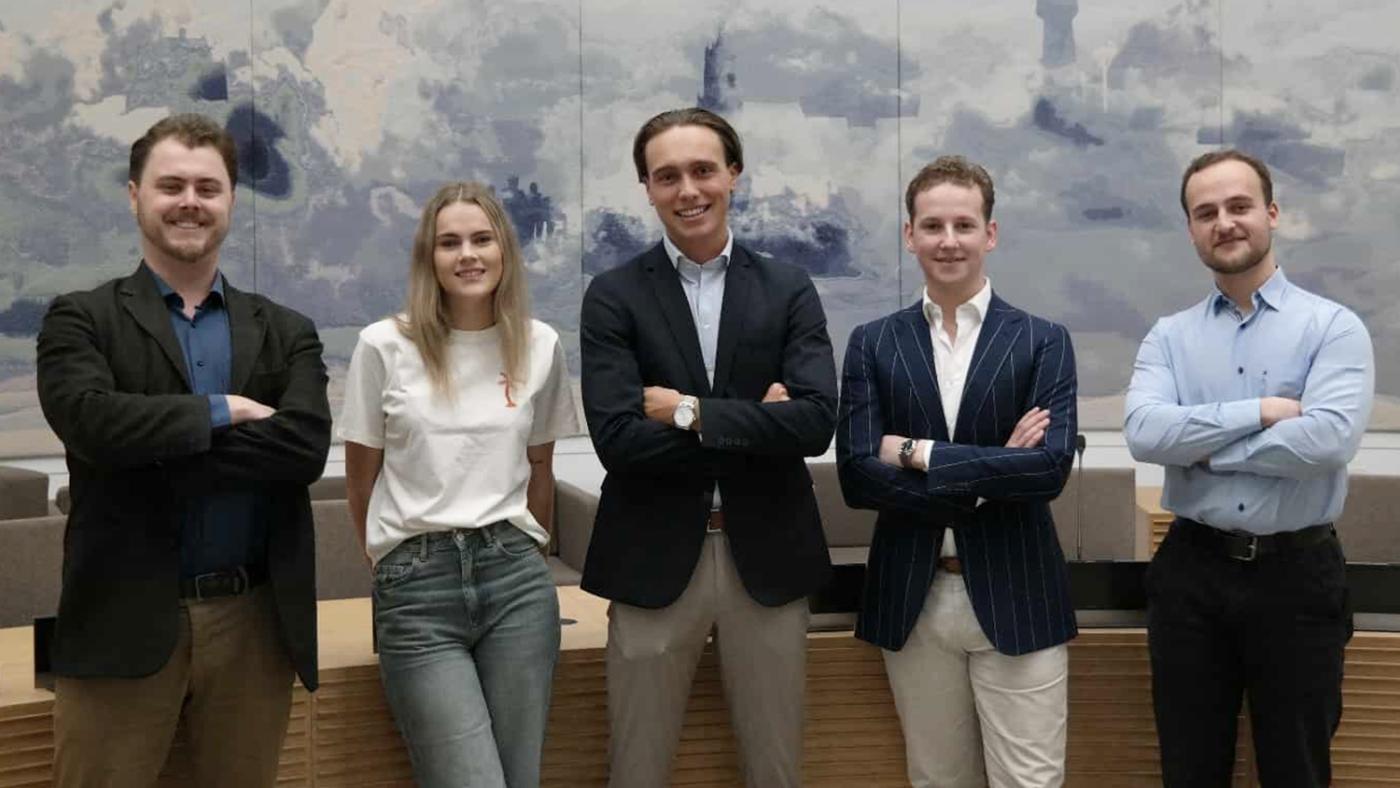
Photo: VSP
Side note
Does VSP's rise mean UU students are more prone to adhering to far-right views? Not necessarily. The percentage of students voting in the elections for co-determination councils has been pretty low for many years. In fact, VSP may owe its seats in the faculty council of Law, Economics & Governance to this.
In that faculty, the regulations for faculty council elections require all three departments to be represented in the student section. VSP was the only party running at the Department of Management & Organisation Science, so the first three candidates on the list could join the faculty council.
This is not the first time such a thing has happened. Two years ago, all spots for the Department of Management & Organisation Science were claimed by De Vrije Student, a more moderate version of VSP. Other faculty councils have similar arrangements whereby specific parties or individuals are elected automatically if there aren't any competitors.
Faculty dean Elaine Mak hopes this will motivate students from the Department of Management & Organisation Science on the other side of the political spectrum to run for the next elections. After all, the co-determination process should include "various voices from the entire faculty community." According to her, "It is up to councillors and administrators to address each other should anti-rights or anti-democratic statements be made." She is confident that this will happen if necessary.
Mirko Noordegraaf, head of the Department of Management & Organisation, stresses that the elections were conducted carefully and that the result did not cause any controversy within the department. Nevertheless, he urges students to get involved in the co-participation process. "We can't say anything about what students want to contribute to the council, but we can encourage multiple perspectives. Providing different views on governance is, nota bene, the core of our courses. We cannot be blind to it at home if the outcome of legitimate elections does not properly reflect our student community."
Hospers, from VSP, also laments the low turnout in the elections. He says that VSP's victory in the Faculty Council of Law, Economics & Governance does not reflect any particular strategy. "We did not know beforehand that there would be no counterlists. We are mainly there because of other students' enthusiasm for our party. Maybe there was more enthusiasm in the Faculty of Law, Economics & Governance because Lloyd and I study there."